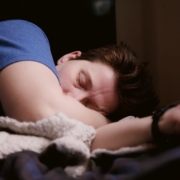Sleep Disturbances in Patients with Bipolar Disorder
Sleep problems are common among people living with bipolar disorder (BD). “Sleep disturbances in bipolar disorder are present during all stages of the condition and exert a negative impact on overall course, quality of life, and treatment outcomes,” wrote Alexandra Gold and Louisa Sylvia in their 2016 study about the role of sleep in bipolar disorder.
Disruption of anybody’s sleep schedule can impact their quality of life and daily functioning, as we all well know, but healthy sleep patterns are especially important for people with mental health conditions such as major depression, schizophrenia, and bipolar disorder.
“Mental health is affected by sleep in several ways,” wrote Short, Bartel, and Carskadon in Sleep and Health. “Overall, insufficient and poor-quality sleep is associated with worse mood and emotion regulation, as well as increased likelihood of developing a mood or anxiety disorder, and heightened risk of suicidal ideation.”
“Sleep patterns play a significant role in bipolar disorder,” as Geralyn Dexter, LMHC, explained in an article on verywellhealth.com, “Bipolar disorder is a mental health condition characterized by fluctuations in mood. A person with bipolar disorder can experience euphoric highs and devastating lows. In up to 80 percent of cases, bipolar disorder can negatively impact sleep. It may even be triggered by sleep issues in some cases.”
Various sleep problems are associated with BD, including nightmares, trouble falling or staying asleep, sleep apnea (when breathing repeatedly stops and restarts throughout the night), poor quality sleep, and more. “Mania and hypomania are linked to a decreased need for sleep. Lack of sleep can also trigger mania,” wrote Dexter.
In other words, the impact of sleep disruption can seriously exacerbate BD symptoms, and achieving a healthy sleep pattern can help ease symptoms.
Treatment for bipolar disorder often involves a combination of medication and psychotherapy. A healthcare provider may also prescribe medication and/or behavioral interventions to help patients get better sleep.
Behavioral interventions may include: establishing and maintaining a set sleep schedule, creating a wind-down routine, and limiting exposure to light, including from screens and other stimulations, close to sleep times.
To avoid sleep disruption before it becomes a problem, it could be useful to make certain lifestyle changes. In her article, Geralyn Dexter provided a few useful tips:
- Limit your alcohol intake and consume less caffeine.
- Keep a consistent sleep schedule by getting up at the same time every day.
- Limit your exposure to light and screen time before bed.
- Avoid naps, especially closer to bedtime.
- Get out of bed if you aren’t able to sleep.
- Gently expose yourself to light during the daytime.
Colorado Recovery provides the services needed to address schizophrenia, bipolar disorder, and other serious mental illnesses which are specific to each individual. Call us at 720-218-4068 to discuss treatment options for you or the person you would like to help.





